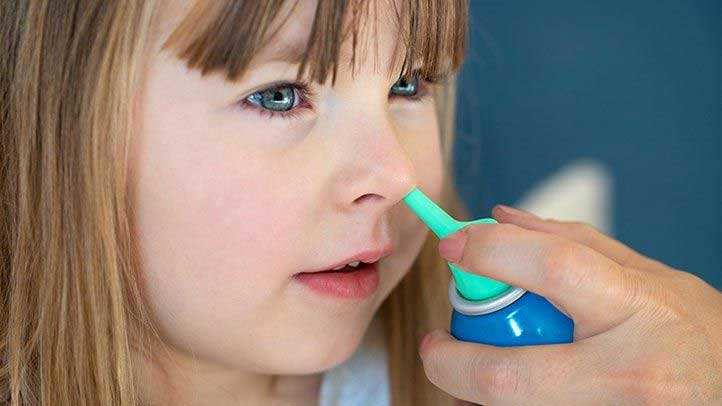
It’s hard to watch your child suffer with a stuffed nose and facial pain when their sinuses are inflamed. You might feel the impulse to visit the pediatrician to get an antibiotic prescription, especially if the discharge coming out of their nose is thick and pus-filled.
But in most cases, it is better to stifle that “see the doctor” impulse.
Antibiotic Drugs Probably Won’t Help Your Child’s Sinus Infection
“Parents often think their child has a bacterial sinus infection, but the majority of the time the pain and discharge are caused by a virus, which antibiotics don’t treat,” says Barbara Rolnick, MD, a pediatrician at the Children’s Hospital of Philadelphia Primary Care Practice Network.
That’s why doctors are often reluctant to prescribe antibiotics right away. The guidelines pediatricians follow say in most circumstances it is equally effective to wait several days to see if the sinus problem improves on its own as it is to write an Rx. And avoiding unnecessary antibiotics, and the subsequent increase in antibiotic-resistant germs, is good for your child.
Don’t Give Your Child a Decongestant Drug, Either
Reaching for drugstore products to relieve your young child’s discomfort should also be avoided, researchers now say. A study published in October 2018 in the British Medical Journal found there is no evidence that commonly used decongestants do anything to help nasal symptoms in children. The authors say kids under age 6 should never be given these medicines, while those 6 to 12 should take them with caution because any benefit might be outweighed by side effects like upset stomach or drowsiness.
So what actually does work? Not much has been proved scientifically, the BMJ study found. But pediatricians say their experience shows home remedies often ease your child’s discomfort until the immune system clears it up.
-
Take Your Child Into a Warm Shower to Help Ease Congestion
Because steam moistens the sinus passageways, which both helps your child feel better and may cause mucous clumps to pass, warming up your child’s sinus passages is a wonderful treatment, Dr. Rolnick says.
Rolnick doesn’t recommend leaning over a pot of steaming water as adults sometimes do, because the child might touch or knock over the water and get burned. Instead, she suggests placing the child in a warm shower, accompanying them if the child is young.
An alternative is to have your child lie on the bed while you place a warm washcloth over their nose and cheeks. The best way to heat up the washcloth is to run it under warm water, then squeeze the liquid out. Have a second washcloth handy so you can replace it as it cools.
-
Breathe in Essential Oils for Calming Relief
Although the BMJ review says there is no scientific confirmation that inhaling oils improves sinus inflammation, many children find oil of eucalyptus does help them breathe, Rolnick says.
You never want to put essential oils directly on the skin. Instead, place a few drops of eucalyptus oil on a ball of cotton (you can also add a drop of lavender or other relaxing oils) and hold it a few inches from your child’s nose.
-
Try Nasal Irrigation to Wash Out Sinus Passages
Nasal irrigation is the only remedy where there is evidence in children that it lessens the severity of a plugged nose, although the authors of the BMJ review note the studies were small.
Irrigation is a method of using a sterilized saltwater solution to force out germs and plugged-up mucous residing in the sinus passages. Other terms for this are “nasal wash” or “nasal douche.”
Adults sometimes get the water into the nose via a device called a neti pot, so this method is sometimes known by that name.
-
Saline Spray Bottles Are More Kid-Friendly Than Neti Pots
However, most children do not like the sensation of the neti pot, so it’s best not to use the device with them. A saline spray bottle, or, for very young children, an eyedropper, is best, Rolnick says. Fine mist saline sprays from brands such as Simply Saline and Little Noses are sold in most drugstores.
Alternatively, you can make your own solution. Begin by buying water labeled “distilled” or by boiling tap water for three to five minutes, then cooling to room temperature. This will avoid the rare possibility of introducing a parasite into your child’s sinuses.
The American Academy of Allergy, Asthma & Immunology suggests this recipe: Mix 1 cup of the cool sterilized water with 3 teaspoons (tsp) of non-iodide salt (iodide may irritate the nasal lining), and 1 tsp of baking soda.
Fill the spray bottle or eyedropper with the liquid and either squirt it into your child’s nose or lie your young child on the back and drip the liquid in. Keep tissues nearby to catch the liquid after it drains out.
-
Consider Nose Strips to Ease Breathing in Older Kids
Although Rolnick says even older children typically pull off those drugstore nose strips as soon as you place them on, when they do stay on they open the passageways enough to help your child breathe easier.
If you have an older child you think might allow the strips to remain, especially when they are sleeping, this could be worth a try.
-
For Long-Term Respiratory Health, Improve Your Child’s Diet and Eating Habits
Many kids are finicky eaters, passing the day with crustless PB&J or fish-shaped crackers. But a healthy, varied diet is crucial for allowing the body to mount the best immune defenses, Rolnick says. You may not be able to get your child to eat their veggies in the midst of their sinus flare-up, but once the child feels better, this is something to work on.
Similarly, ensure that your child drinks enough healthy liquids, which not only aids the immune system, it keeps their sinuses lubricated. Because many children have only periodic access to water during day care or school, be sure to give them plenty of water or milk during breakfast and after school at home, and pack a water bottle (not sweetened juice drinks) in their lunch.
-
Consult a Doctor if Home Remedies Don’t Help Sinus Symptoms
If symptoms persist without improvement for more than 10 days, you should consult your pediatrician.
You should also call the doctor before that time if your child’s sinus pain is accompanied by fever and a discharge for several days, or if their symptoms significantly worsen. In these cases, antibiotics may be appropriate.
Important Notice: This article was originally published at www.everydayhealth.com by Meryl Davids Landau where all credits are due. Medically Reviewed by Justin Laube, MD
Disclaimer
The watching, interacting, and participation of any kind with anything on this page does not constitute or initiate a doctor-patient relationship with Dr. Farrah™. None of the statements here have been evaluated by the Food and Drug Administration (FDA). The products of Dr. Farrah™ are not intended to diagnose, treat, cure, or prevent any disease. The information being provided should only be considered for education and entertainment purposes only. If you feel that anything you see or hear may be of value to you on this page or on any other medium of any kind associated with, showing, or quoting anything relating to Dr. Farrah™ in any way at any time, you are encouraged to and agree to consult with a licensed healthcare professional in your area to discuss it. If you feel that you’re having a healthcare emergency, seek medical attention immediately. The views expressed here are simply either the views and opinions of Dr. Farrah™ or others appearing and are protected under the first amendment.
Dr. Farrah™ is a highly experienced Licensed Medical Doctor certified in evidence-based clinical nutrition, not some enthusiast, formulator, or medium promoting the wild and unrestrained use of nutrition products for health issues without clinical experience and scientific evidence of therapeutic benefit. Dr. Farrah™ has personally and keenly studied everything she recommends, and more importantly, she’s closely observed the reactions and results in a clinical setting countless times over the course of her career involving the treatment of over 150,000 patients.
Dr. Farrah™ promotes evidence-based natural approaches to health, which means integrating her individual scientific and clinical expertise with the best available external clinical evidence from systematic research. By individual clinical expertise, I refer to the proficiency and judgment that individual clinicians acquire through clinical experience and clinical practice.
Dr. Farrah™ does not make any representation or warranties with respect to the accuracy, applicability, fitness, or completeness of any multimedia content provided. Dr. Farrah™ does not warrant the performance, effectiveness, or applicability of any sites listed, linked, or referenced to, in, or by any multimedia content.
To be clear, the multimedia content is not intended to be a substitute for professional medical advice, diagnosis, or treatment. Always seek the advice of your physician or other qualified health providers with any questions you may have regarding a medical condition. Never disregard professional medical advice or delay in seeking it because of something you have read or seen in any website, video, image, or media of any kind. Dr. Farrah™ hereby disclaims any and all liability to any party for any direct, indirect, implied, punitive, special, incidental, or other consequential damages arising directly or indirectly from any use of the content, which is provided as is, and without warranties.








